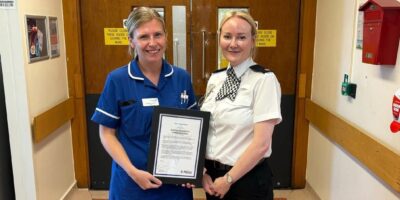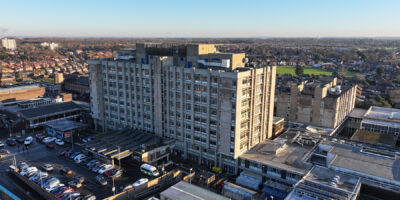Using Meta’s Oculus Quest 2 virtual reality headset as well as Oxford Medical Simulation software, the students were able to see and interact with a computer-generated bedside hospital scenario of a patient, as part of a training simulation.
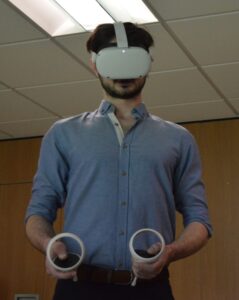
During the scenario, the headsets tracked participant’s physical movements, allowing them to interact with the medical equipment and patient within the scenario. By doing so, they were able to administer tests, ask the patients questions, give medicines based on their results and diagnose.
The scenarios also allowed the students to interact with other medical professionals, such as radiologists and nurses, just as they would in a practical bedside examination. The session then concluded with the clinician calling a consultant for confirmation of diagnosis.
Two final year medical students attended the pilot session, each undertaking a 15-minute scenario followed by a debrief with a fully qualified doctor lasting around 15 to 20 minutes.
The VR headset was connected to a television, meaning that what was seen in the headset could be seen by all those in attendance. The simulation software also gave a percentage score at the end of the scenario allowing the students a better understanding of how well they did.
One of the students reported after the session that “The VR session was excellent and worthwhile as a supplement to traditional simulation. I particularly enjoyed the variety of patients and scenarios that were available to assess.”
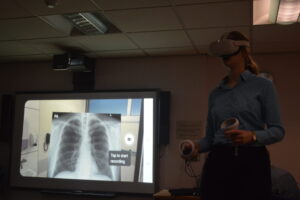
There are over 200 scenarios that the medical students can explore using the Oxford Medical Simulation including, paediatrics, emergency scenarios and bedside procedures.
Professor Sam Debbage, Director of Education and Research at DBTH said about the pilot: “Virtual reality is such an exciting prospect that we are exploring here at DBTH, being able to allow our learners to explore real-life scenarios without risk to patients allowing them to build confidence in approaching a range of scenarios.
The Trust has a long way to go when it comes to perfecting this type of training, but the opportunity of continuing to expand our learning environments is critical to give our learners a well-rounded approach to patient care.”
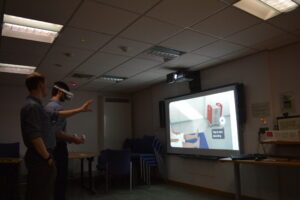
This session was just a pilot but DBTH is looking at how the Trust can carry this training forward to help advance technology-enhanced learning.
Doncaster and Bassetlaw Teaching Hospitals NHS Foundation Trust is one of Yorkshire’s leading acute trusts, serving a population of more than 420,000 across South Yorkshire, North Nottinghamshire and the surrounding areas.
Hosting three main hospital sites and several additional services, the Trust is one of only a small number of Teaching Hospitals in Yorkshire and trains 25% of all medical students and 30% of all other healthcare professional students.

